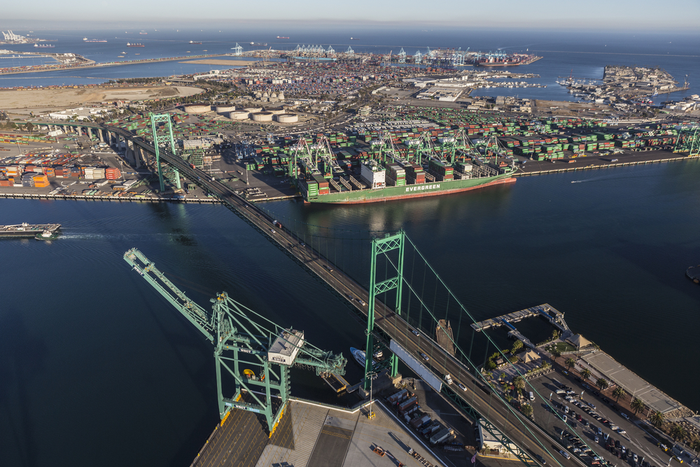Terminal operators will increase the traffic mitigation fee (TMF) used to fund night and weekend gates at the Los Angeles-Long Beach port complex by 4.2 percent starting Aug. 1.
The TMF, which is adjusted each year based on the West Coast longshore contract, will increase to $33.47 per TEU and $66.94 per FEU on all non-exempt containers, the West Coast Marine Terminal Operators Agreement (WCMTOA) announced Tuesday. Exempt containers include empties, laden containers that transit the Alameda Corridor, and containers that are transshipped. Empty chassis and bobtail trucks are also exempt, WCMTOA said in a statement.
In addition to the 8 a.m. to 5 p.m. weekday gates that most US ports offer, the 12 container terminals in Southern California normally operate four weeknight gates and one weekend day gate. When it was instituted in 2005, the TMF was charged only on container moves made during the peak daytime hours when traffic on local streets and freeways was the heaviest.
Originally, truck moves in the off-peak hours did not pay the fee, but that changed in late 2018.
By discouraging daytime traffic, the TMF created operational problems, including truck “bunching” in the late afternoon as truckers queued up outside the gates, waiting for the fee to end with the beginning of the night shift.
PierPass Inc., which manages the extended gates program for WCMTOA members, in late 2018 switched to a flat fee charged on all non-exempt truck moves, both day and night. John Cushing, PierPass president, told JOC.com last December that as a result of the new flat fee, truck bunching at terminal gates was eliminated, truck turn times improved, and the approximately 50-50 split between peak and off-peak hours remained.
Steady improvement in LA-LB turn times
Truck turn times in Los Angeles-Long Beach have steadily improved over the past two years due to an outreach program by the Harbor Trucking Association (HTA) with terminal operators and, more recently, declining cargo volumes during the coronavirus disease 2019 (COVID-19). The average truck visit time in May was 59 minutes. That compares with turn average times of 90 minutes or longer in early 2019, according to the HTA.
WCMTOA said revenue generated by the TMF only partially offsets the costs terminal operators incur for night and weekend gates. The consulting firm SC Analytics determined the TMF generated $223 million last year, but the 12 terminals in aggregate incurred $262 million in additional costs for operating the extended gates.
When the PierPass extended gates program was established in 2005, Los Angeles-Long Beach was the only North American port complex with a standardized program of night and weekend gates. In addition to extending gate hours to accommodate growing cargo volumes, the off-peak program was developed in response to community pushback over port-generated traffic congestion and pollution.
As other gateways in recent years encountered congestion and pollution problems, ports or their terminal operators in New York and New Jersey, Oakland, Montreal, and Vancouver, Canada, developed fee-based programs for extended gates.
Source of this article and other great articles


